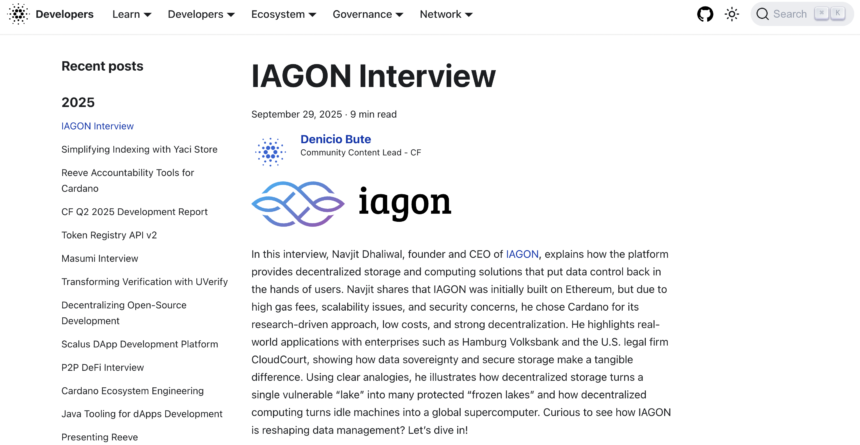In this interview, Navjit Dhaliwal, founder and CEO of IAGON, explains how the platform provides decentralized storage and computing solutions that put data control back in the hands of users. Navjit shares that IAGON was initially built on Ethereum, but due to high gas fees, scalability issues, and security concerns, he chose Cardano for its research-driven approach, low costs, and strong decentralization. He highlights real-world applications with enterprises such as Hamburg Volksbank and the U.S. legal firm CloudCourt, showing how data sovereignty and secure storage make a tangible difference. Using clear analogies, he illustrates how decentralized storage turns a single vulnerable “lake” into many protected “frozen lakes” and how decentralized computing turns idle machines into a global supercomputer. Curious to see how IAGON is reshaping data management? Let’s dive in!
Hello, Navjit! It’s a pleasure to connect with you today. Before we dive into IAGON and all the exciting things you’re working on, let’s start with you. Can you share a bit about yourself, your background, and what led you to the world of blockchain and Cardano
Hello, and thank you for having me. I’m Navjit Dhaliwal, founder and CEO of IAGON. My background is in healthcare, I am a dentist by profession, but I have always had an interest in technology and did some programming in high school. In 2013, I came across the Bitcoin whitepaper. It took a few readings, but I became fascinated by the potential of blockchain, especially in areas like data security.
In healthcare, patient data privacy is critical, yet much of it is stored in centralized systems that can be accessed or shared without consent. That inspired me to explore decentralized solutions where users remain in control of their own data. What began as a healthcare-focused idea eventually grew into IAGON, a broader distributed cloud storage and computing platform.
We started on Ethereum but quickly realized the limitations, high gas fees, scalability issues, and security concerns, which did not align with our vision. Cardano, with its scientific research approach, cost-effectiveness, and strong decentralization, was a much better fit. In 2021, we migrated to Cardano, and it has proven to be the right decision.
Every great project starts with a vision. What was the spark that led to the creation of IAGON? What problem did you see in the world that made you say, “We need to solve this”?
The idea started with protecting medical and patient data. Over time, with my co-founders, the vision expanded into a more general cloud solution. We saw a pressing need for secure, private, and sovereign storage where users, not corporations, control their data.
With IAGON, files are sharded, encrypted, and distributed across the network, ensuring only the owner can access them. This “data sovereignty” principle is at the heart of what we do.
Building on a blockchain is a big decision. What made Cardano the right choice for IAGON, and what unique advantages does it offer for what you’re creating?
For us, three things stood out: security, decentralization, and cost-effectiveness. Cardano aligns with our research-first ethos, and its transaction fees make our business model viable. On Ethereum, gas fees could reach $20 to $40 or more, making it impossible for us to offer cost savings compared to centralized providers. With Cardano, we can provide up to 80 percent more cost-effective solutions while maintaining high security and decentralization.
Now that we’ve established the differences, I’d like to explore how decentralized data storage actually works. What’s the core principle behind it, and how does it change the way we think about storing data?
In traditional systems like Google Cloud or AWS, data is stored in silos. If a server is breached, large amounts of information can be exposed. I often describe it as a single “data lake.” Once someone gets past the fence, meaning encryption, they can swim freely and access files.
With decentralized storage, data is encrypted, broken into shards, and distributed across multiple nodes worldwide. Imagine many smaller frozen lakes instead of one big one. Even if someone breached one, they would find nothing readable. Only the original owner, using their private key, can reassemble and access the data. That is the fundamental shift, security and control move from centralized entities back to the individual.
What are some of the biggest benefits of decentralized storage? Can you share a scenario where this approach makes a real-world difference?
What are the biggest benefits of decentralized storage, and can you share a real-world scenario where it makes a difference?
Navjit Dhaliwal: The biggest benefit is sovereignty, you fully own and control your data. Another is compliance. With IAGON, data shards can be allocated to specific regions, enabling compliance with laws like GDPR in Europe.
Enterprises recognize this value. For example, we are working with Würth Group on using encrypted storage for 3D parts, and with Hamburg Volksbank in Germany to give users sovereignty over their data. A U.S. legal firm, CloudCourt, is also exploring how our solution can secure litigation documents. These are diverse industries, but all face the same need, secure, compliant, user-controlled data storage.
Of course, no solution is perfect. What are some of the biggest challenges in decentralized storage, and how is IAGON working to overcome them?
One challenge is simply the scope of what we are building, we have many enterprise and Web3 projects underway, which stretches our resources.
On the technical side, a key challenge is indexing and proving file permanence on-chain. To address this, we are developing a network explorer to decentralize and improve transparency around data storage and retrieval.
We’ve talked about storage, but computing power is another major piece of the puzzle. If you had to explain decentralized computing to a beginner, how would you describe it?
Think of decentralized computing as connecting idle computers around the world into one giant supercomputer. Every app, website, and digital service depends on compute power, and we are creating a distributed model where unused capacity can be harnessed.
For example, if a company has powerful servers sitting idle after hours, that computing power could be contributed to IAGON’s network. Users can then access it for AI or machine learning tasks at a fraction of the cost of centralized providers. It is like an “Airbnb for compute.”
Why is decentralization important for computing power? What challenges do traditional, centralized computing models face, and how does a decentralized approach help overcome them?
The main issue with centralized computing is cost. AI and machine learning require massive compute resources, and even the largest corporations struggle with profitability because it is so expensive.
By using idle compute and creating an incentive economy for node operators, we reduce costs and make computing more accessible. Instead of sitting unused, resources are turned into revenue streams. This benefits both enterprises and individuals who contribute capacity.
Who are the ideal users of IAGON? What kind of businesses or individuals would benefit the most from this technology?
Our solutions apply broadly, but enterprise adoption is leading the way. Different industries, from manufacturing to banking to legal services, are finding use cases for decentralized storage and compute.
That said, we are also building user-friendly solutions for retail, such as a decentralized alternative to Dropbox, which we plan to release in the near future. Both businesses and individuals can benefit from secure, compliant, and cost-effective data solutions.
As we look to the future, what are IAGON’s biggest goals for the rest of 2025? What’s next on the roadmap?
Our top priority is delivering the Würth Group MVP, which could generate $50 to $100 million in revenue within its first two years and scale to a billion-dollar market. With IAGON earning royalties, it will be transformative for our company and node operators. That is our main focus right now, establishing a strong, revenue-generating foundation.
Are there any exciting new features, partnerships, or integrations coming up that you can share with us?
Yes, several. We have new exchange listings in October, a major update to our node software, and the launch of “Cyclone,” a plug-and-play node solution for retail users. We are also working on a new UX and UI for our storage platform, which will make it more intuitive and collaborative. These are the developments I am personally most excited about.
Where do you see decentralized computing and storage heading in the next few years? What role do you think IAGON will play in shaping that future?
We believe adoption is moving in the right direction. The fact that major enterprises are reaching out to us, rather than the other way around, shows strong validation.
Many DePIN projects struggle to bridge into the Web2 world, but we are already doing that. Our goal is to lead enterprise adoption of decentralized storage and computing, setting the standard for compliance, security, and sovereignty.
If there was one thing you wish more people understood about decentralized computing and storage, what would it be?
The importance of data sovereignty. Too often people overlook how much of their personal information is collected and monetized by free tools and services. Owning your keys and your data is not just a technical detail, it is about freedom, privacy, and control in the digital age. If both individuals and enterprises demand this, the industry will evolve in the right direction.
Maybe a question I should have asked earlier, but I figured, let’s not close without asking: What do you enjoy doing in your free time, outside of the world of crypto?
Startups in Web3 are demanding, but I make time for my family. I enjoy playing board games and sports with my kids, especially basketball and skiing. I am also a big fan of team sports in general.
And a small fun fact, I only started drinking coffee in 2019, it is a relatively new habit for me, but one I enjoy.
Tell us about your team. Who are the people behind IAGON?
Iagon is powered by a growing international team of engineers, researchers, and business professionals who share one mission: bringing secure, compliant, and decentralized cloud solutions to the world.
At the core, our founding team has been building since 2017 and brings PhD-level expertise across key areas — blockchain Dr. Claudio Lima, distributed computing Dr. Rohit Gupta, AI and machine learning Dr. Elad Harison, and healthcare & entrepreneurship Dr. Navjit Dhaliwal. Together, they designed the core architecture of our network, established its foundation, and filed a patent to protect our innovation.


























